The complete specifier’s guide to high performance solid surfaces
- 29 June 2025|
- Blogs|
- velstone_admin
Solid surfacing is now a popular building material for worktop materials in a vast number of applications in the construction sector. As only one of five companies globally with more than 30 years’ experience in manufacturing solid surfaces, at Velstone we know how important it is for architects to be able to specify high performance solid surface material with confidence.
Key Highlights
- Solid surfaces like Velstone are ideal for high-use environments due to their durability, seamless design, and hygienic, non-porous properties
- Key specification factors include intended application, material thickness, durability, fabrication ease, hygiene standards, and supplier reliability.
- Compared to quartz and granite, solid surfaces offer superior customisation, seamless installation, easy maintenance, and better hygiene performance.
- Velstone stands out with its composition, custom colours and finishes, and availability in both 13mm and 25mm sheet thicknesses.
- Velstone supports specifiers with expert guidance, customisation options, and technical resources—enabling confident specification and outstanding results across sectors.
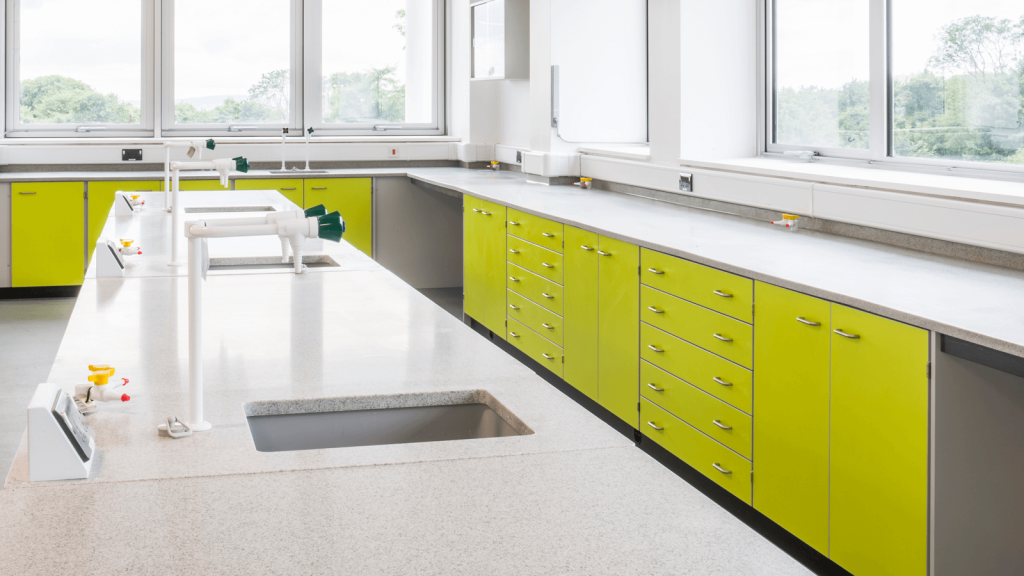
Why is specifying high performance solid surface material so important?
In high-use environments, from hotels to student accommodation, your material choices matter. Poor specification leads to costly repairs, hygiene risks, and aesthetic degradation. Solid surfaces, particularly Velstone, solve this with high-quality materials that deliver on design, durability, and cleanliness.
What should architects consider when specifying solid surfaces?
When specifying high performance solid surface material, it’s essential to weigh performance against practicality and aesthetic potential. Here’s what every specifier must consider:
- Application Requirements
Is the material intended for healthcare, hospitality, retail, or transport? Will it be exposed to moisture, heat, or heavy daily use?
- Material Thickness
Choose the appropriate thickness based on the application, including a minimum 13mm (with substrate) for horizontal applications or 25mm for applications without the need for a substrate.
- Durability & Longevity
Impact-resistant materials with excellent repairability and long lifespans will mean that the surface will not need replacing for a very long time, making it a sustainable choice.
- Design Versatility
Does the solid surface support thermoforming, seamless joins, and integrated features?
- Lead Time & Availability
Choose suppliers with reliable stock, quick turnaround times, and consistent quality.
- Ease of Fabrication & Installation
Ensure the product is supported by fabrication and installation guidelines and the manufacturer’s technical data sheets.
- Maintenance & Hygiene
Specify materials that are non-porous, easy to clean, and compliant with hygiene codes, especially for healthcare, food service, and education.
- Brand
Look for a brand that has experience in the sector you are specifying the solid sector for and can cope with what you want when it comes to colours and lead times.
What is solid surface made of?
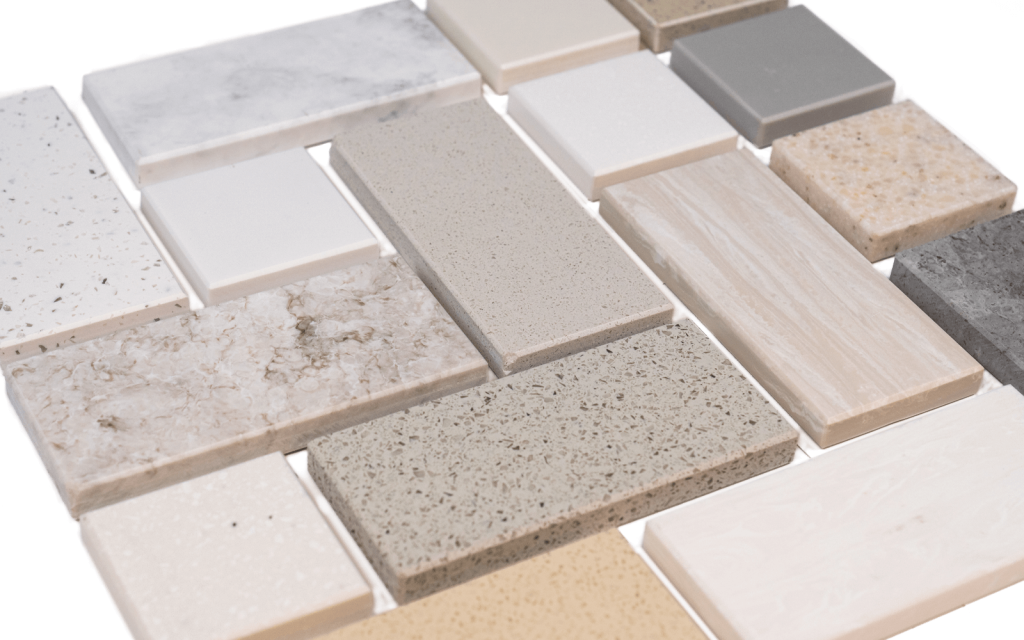
Solid surfaces are engineered materials made from acrylic or polyester resins, combined with fillers and pigments. Unlike granite or quartz, which incorporate natural stone, solid surface materials are 100% synthetic, offering seamless design, non-porous hygiene, and easy repair.
| Feature | Solid Surface | Quartz | Granite |
| Composition | Synthetic (resin + filler) | Natural stone + resin | Natural stone |
| Seamlessness | Seamless joins | Visible seams | Visible seams |
| Maintenance | Non-porous, repairable | Non-porous, may chip | Porous, high maintenance |
| Customisation | Thermoformable | Limited | None |
| Hygiene | Excellent | Good | Moderate |
Where are solid surfaces commonly specified?
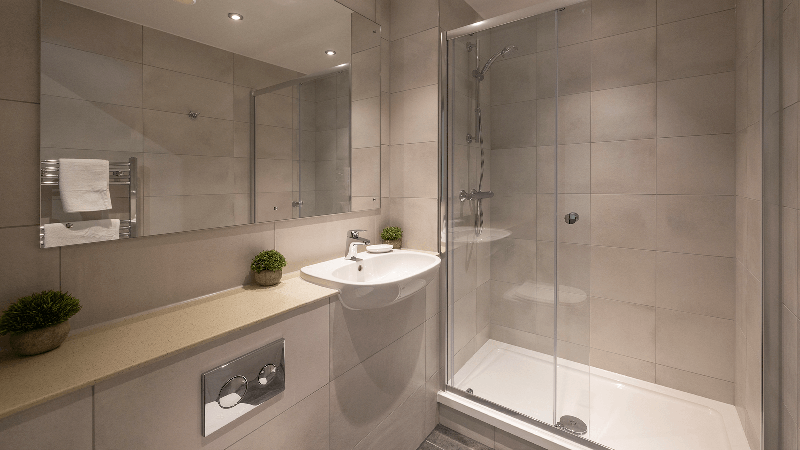
Solid surface materials are specified in a wide range of sectors due to their durability, hygiene, and design flexibility, and are particularly suitable for high-traffic and highly used areas.
Main Application Areas:
- Hotels – Stylish, luxurious finishes with low maintenance.
- Education – Hard-wearing and safe for student-heavy spaces.
- Laboratories – Chemical resistant and easy to sanitise.
- Student Accommodation – Durable, customisable, and easy to maintain.
- Healthcare – Non-porous and seamless for strict hygiene protocols.
- Retail & Leisure – Impact-resistant and easy to clean.
- Airports & Cruise Ships – Lightweight, fire-resistant, ideal for high-traffic zones.
- Modular Kitchens & Bathrooms – Flexible and quick to fabricate and install
Why specify solid surface materials?
Solid surfaces are chosen for their outstanding performance, hygiene, and aesthetics, making them ideal for commercial and residential spaces.
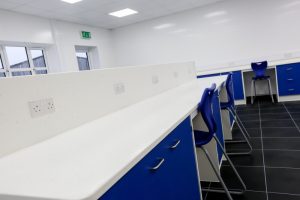
Key Benefits include:
- Durability: Resistant to scratches, heat, and impact.
- Hygiene: Non-porous and resistant to bacteria.
- Customisation: Easily thermoformed, engraved, or integrated with other elements.
- Repairability: Chips and marks can often be repaired in place.
- Sustainability: Long lifespan reduces replacement needs.
- Design Flexibility: Wide colour ranges and finishes to suit any brand or space.
Velstone: Solid surface excellence
Velstone is engineered for high performance across all environments and the most demanding projects. Whether you’re specifying for a hotel, university laboratory, or luxury cruise liner, Velstone delivers unbeatable durability, hygiene, and design freedom.
What makes Velstone stand out?
Composition: Velstone’s blend of Alumina Trihydrate and acrylic resin delivers high-breaking strength and fire resistance.
Thickness & Size: Velstone is available in maximum width of 900mm in standard thicknesses of 13mm and 25mm.
Colours & Finishes: Velstone is available in a wide range of custom colours and gloss finishes.
Seamless Hygiene: Velstone is 100% non-porous and bacteria-resistant.
Specifying Velstone
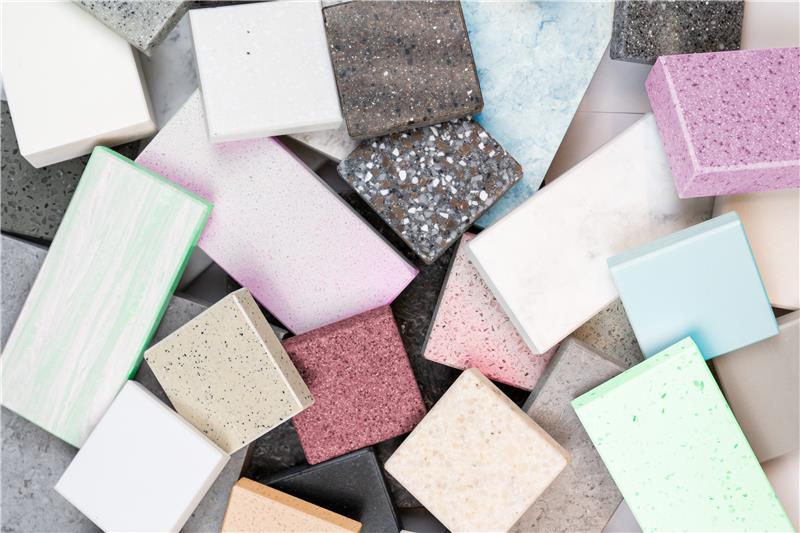
Consider the application Velstone will be used for, whether countertops or wall cladding, so that it best meets the demands of the space.
Then specify the right sheet thickness. A minimum 13mm sheet thickness for all horizontal applications is required, and this should be supported by minimum 25mm MDF or 15mm Plywood.
Our 25mm thickness which does not require an MDF substrate, is perfect where straight length worktops are required, e.g. vanity tops for homeowners or hot/cold servery counters required in commercial spaces.
Choose the colour of your solid surface, from our range of standard colours or our bespoke colour matching service, and the finish, including matte, satin and gloss.
Velstone should always be fabricated and installed as per our recommended guidelines to ensure performance and compliance.
Ready to specify Velstone for your next project?
Speak with our team to find the right product, colour, and thickness for your next project. From initial consultation to fabrication support, Velstone helps architects and designers deliver exceptional outcomes with confidence.
Contact us now to discuss your solid surface project or request a free sample.
FAQs on specifying solid surfaces
What can solid surfaces be used for and what is the difference between solid surface and quartz?
Solid surfaces are seamless and thermoformable; quartz has visible seams and less design flexibility. Solid surface is ideal for a range of applications including countertops and wall cladding.
What’s the ideal thickness for countertops?
For solid surface products, it depends on the application they are being used for, but use minimum 13mm sheets with substrate, or 25mm without.
Do solid surfaces provide design flexibility?
Yes, the design iterations of solid surfacing such as Velstone are virtually endless thanks to bespoke colour matching to match any design or branding.
How sustainable are solid surfaces?
With proper care and repair options available, solid surfaces are long-lasting and can be repaired. And fewer replacements means sustainable.
Can solid surfaces be used in healthcare settings?
Yes. Solid surfaces are non-porous and resistant to bacteria, fungal growth and staining, making them a hygienic surface material.